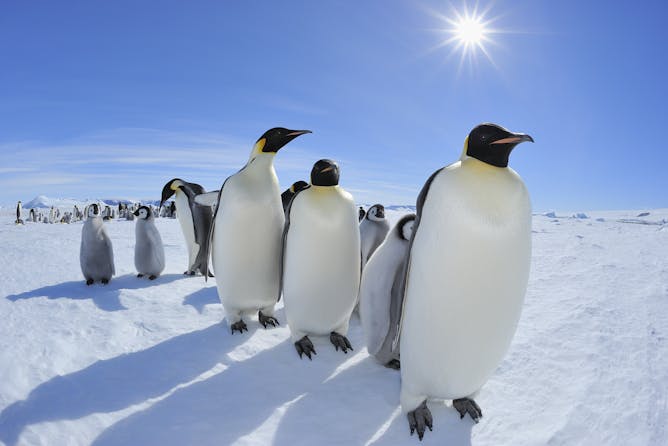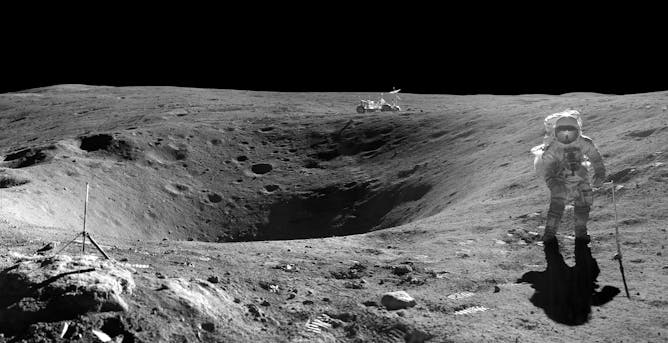|
|
|
|
Welcome to this week’s science newsletter, which takes us from the Moon to Antarctica and many other spots on Earth.
A study published yesterday paints a grim picture for the future of emperor penguins in Antarctica, due largely to the effects of climate change. “Like Goldilocks, they have a narrow comfort zone,” writes scientist Stephanie Jenouvrier, who first saw these iconic birds while doing her Ph.D. work in the early 2000s. “If there’s too much sea ice, trips to bring food from the ocean become long and arduous, and their chicks may starve. With too little sea ice, the chicks are at risk of drowning.” As a result, the U.S. Fish and Wildlife Service today published a proposed rule to list the emperor penguin as “threatened” under the Endangered Species
Act.
One of the more widely read stories this past week explored a question many people wonder about: What’s behind the decline in male fertility? University of Virginia urologist Ryan P. Smith surveys the research and finds a compelling link to environmental toxins, including the endocrine disruptors found in a range of products. Current research “doesn’t allow us to definitively establish which chemicals are causing the male fertility decline, but the weight of the evidence is growing,” Smith writes.
One of the great things about my job is discovering research subjects that I didn’t even know existed. Case in point is a study published today about the magnetic field of the Moon. It turns out it has not had a magnetic field for most of its history. Geophysicist John Tarduno unravels this long-standing scientific mystery and describes how he got involved by re-examining rock samples from the Apollo missions. It’s not just cool science; the lack of a magnetic field has major implications for fueling human exploration in the future.
Here are some other science highlights from the past week:
If there’s a subject you’d like our team of science editors to investigate, please reply to this email.
|
Martin La Monica
Director of Editorial Projects and Newsletters
|

|
|

Penguins are at risk as a warming climate affects sea ice in Antarctica.
Raimund Linke/The Image Bank via Getty Images
Stephanie Jenouvrier, Woods Hole Oceanographic Institution
Emperor penguins survive in a ‘Goldilocks zone’ between too much sea ice and too little. A new study shows the risk they face from climate change.
|

For decades, sperm counts and sperm health have been declining.
Carol Yepes/Moment via Getty Images
Ryan P. Smith, University of Virginia
People are exposed to toxic substances – like pesticides, chemicals in plastics and radiation – every day. A growing body of research shows that this exposure is causing a decline in male fertility.
|

Scientists have studying lunar samples brought back from Apollo missions to understand the geologic history of the Moon.
NASA
John Tarduno, University of Rochester
Without a magnetic field, the Moon’s surface is exposed to solar wind. These could have been depositing resources like water and potential rocket fuel on the Moon’s surface for billions of years.
|
Other good finds
|
-
Peter Chin-Hong, University of California, San Francisco
The CDC guidance applies to areas with high coronavirus transmission rates – which on the day of the announcement covered 63% of US counties.
-
Fiona Lo, University of Washington
Scientists are building a pollen forecasting model using meteorology, botany, pollen count numbers and satellite imagery to help people plan ahead.
-
Landolf Rhode-Barbarigos, University of Miami; Brian Haus, University of Miami
The Army Corps of Engineers is planning a sea wall 6 miles long and flood gates. The infrastructure might protect downtown from a hurricane storm surge, but most of the area will still be vulnerable.
-
Michael Paul Nelson, Oregon State University; Peter Mark Groffman, CUNY Graduate Center
This kind of research, with consistent data collection at the same locations over time, helps support global understanding of climate change.
-
Ted Schwaba, The University of Texas at Austin College of Liberal Arts
Early exposure to lead pollution may lead to less mature personality traits as an adult.
-
Beverly Law, Oregon State University
Scientists are urging the Biden administration to protect mature US forests as a climate change strategy, starting with the Tongass National Forest in Alaska.
-
Susan J. Prichard, University of Washington; Keala Hagmann, University of Washington; Paul Hessburg, United States Forest Service
More than 40 fire scientists and forest ecologists in the US and Canada teamed up to investigate why wildfires are getting more extreme. Climate change is part of the problem, but there’s more.
|
|
| |
| |
| |
| |

|
| |
| |
| |
| |
| |
| |
| |
| |
|
|
|
|
|
|
|